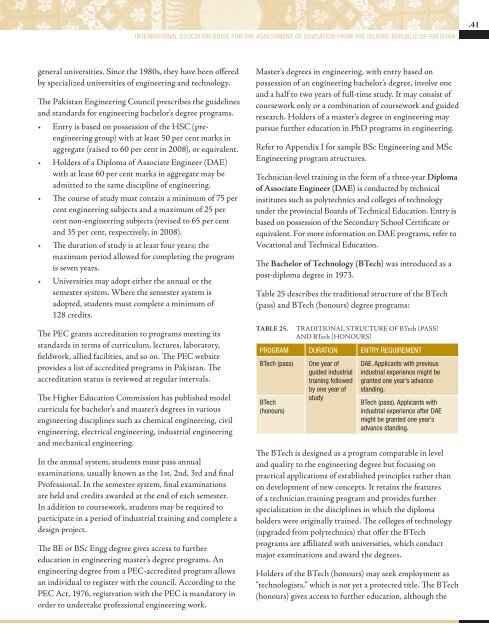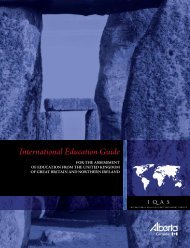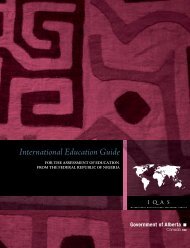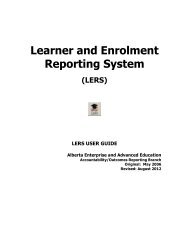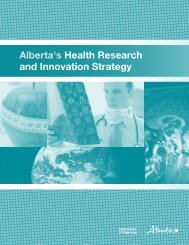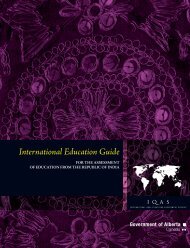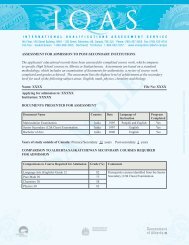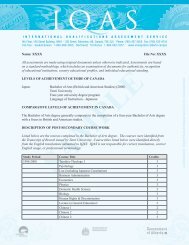International Education Guide - Enterprise and Advanced Education ...
International Education Guide - Enterprise and Advanced Education ...
International Education Guide - Enterprise and Advanced Education ...
Create successful ePaper yourself
Turn your PDF publications into a flip-book with our unique Google optimized e-Paper software.
INTERNATIONAL EDUCATION GUIDE for the assessment of education from the Islamic Republic of Pakistan<br />
.41<br />
general universities. Since the 1980s, they have been offered<br />
by specialized universities of engineering <strong>and</strong> technology.<br />
The Pakistan Engineering Council prescribes the guidelines<br />
<strong>and</strong> st<strong>and</strong>ards for engineering bachelor’s degree programs.<br />
• Entry is based on possession of the HSC (preengineering<br />
group) with at least 50 per cent marks in<br />
aggregate (raised to 60 per cent in 2008), or equivalent.<br />
• Holders of a Diploma of Associate Engineer (DAE)<br />
with at least 60 per cent marks in aggregate may be<br />
admitted to the same discipline of engineering.<br />
• The course of study must contain a minimum of 75 per<br />
cent engineering subjects <strong>and</strong> a maximum of 25 per<br />
cent non-engineering subjects (revised to 65 per cent<br />
<strong>and</strong> 35 per cent, respectively, in 2008).<br />
• The duration of study is at least four years; the<br />
maximum period allowed for completing the program<br />
is seven years.<br />
• Universities may adopt either the annual or the<br />
semester system. Where the semester system is<br />
adopted, students must complete a minimum of<br />
128 credits.<br />
The PEC grants accreditation to programs meeting its<br />
st<strong>and</strong>ards in terms of curriculum, lectures, laboratory,<br />
fieldwork, allied facilities, <strong>and</strong> so on. The PEC website<br />
provides a list of accredited programs in Pakistan. The<br />
accreditation status is reviewed at regular intervals.<br />
The Higher <strong>Education</strong> Commission has published model<br />
curricula for bachelor’s <strong>and</strong> master’s degrees in various<br />
engineering disciplines such as chemical engineering, civil<br />
engineering, electrical engineering, industrial engineering<br />
<strong>and</strong> mechanical engineering.<br />
In the annual system, students must pass annual<br />
examinations, usually known as the 1st, 2nd, 3rd <strong>and</strong> final<br />
Professional. In the semester system, final examinations<br />
are held <strong>and</strong> credits awarded at the end of each semester.<br />
In addition to coursework, students may be required to<br />
participate in a period of industrial training <strong>and</strong> complete a<br />
design project.<br />
The BE or BSc Engg degree gives access to further<br />
education in engineering master’s degree programs. An<br />
engineering degree from a PEC-accredited program allows<br />
an individual to register with the council. According to the<br />
PEC Act, 1976, registration with the PEC is m<strong>and</strong>atory in<br />
order to undertake professional engineering work.<br />
Master’s degrees in engineering, with entry based on<br />
possession of an engineering bachelor’s degree, involve one<br />
<strong>and</strong> a half to two years of full-time study. It may consist of<br />
coursework only or a combination of coursework <strong>and</strong> guided<br />
research. Holders of a master’s degree in engineering may<br />
pursue further education in PhD programs in engineering.<br />
Refer to Appendix I for sample BSc Engineering <strong>and</strong> MSc<br />
Engineering program structures.<br />
Technician-level training in the form of a three-year Diploma<br />
of Associate Engineer (DAE) is conducted by technical<br />
institutes such as polytechnics <strong>and</strong> colleges of technology<br />
under the provincial Boards of Technical <strong>Education</strong>. Entry is<br />
based on possession of the Secondary School Certificate or<br />
equivalent. For more information on DAE programs, refer to<br />
Vocational <strong>and</strong> Technical <strong>Education</strong>.<br />
The Bachelor of Technology (BTech) was introduced as a<br />
post-diploma degree in 1973.<br />
Table 25 describes the traditional structure of the BTech<br />
(pass) <strong>and</strong> BTech (honours) degree programs:<br />
Table 25. Traditional Structure of BTech (Pass)<br />
<strong>and</strong> BTech (Honours)<br />
Program Duration Entry Requirement<br />
BTech (pass)<br />
BTech<br />
(honours)<br />
One year of<br />
guided industrial<br />
training followed<br />
by one year of<br />
study<br />
DAE. Applicants with previous<br />
industrial experience might be<br />
granted one year’s advance<br />
st<strong>and</strong>ing.<br />
BTech (pass). Applicants with<br />
industrial experience after DAE<br />
might be granted one year’s<br />
advance st<strong>and</strong>ing.<br />
The BTech is designed as a program comparable in level<br />
<strong>and</strong> quality to the engineering degree but focusing on<br />
practical applications of established principles rather than<br />
on development of new concepts. It retains the features<br />
of a technician training program <strong>and</strong> provides further<br />
specialization in the disciplines in which the diploma<br />
holders were originally trained. The colleges of technology<br />
(upgraded from polytechnics) that offer the BTech<br />
programs are affiliated with universities, which conduct<br />
major examinations <strong>and</strong> award the degrees.<br />
Holders of the BTech (honours) may seek employment as<br />
“technologists,” which is not yet a protected title. The BTech<br />
(honours) gives access to further education, although the


